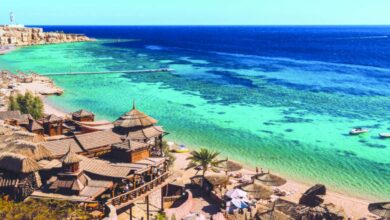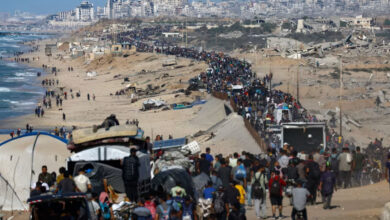State-owned papers Al-Ahram and Al-Akhbar start off today’s news with identical reports on the “redirection of energy subsidies towards poverty-stricken families,” according to their leading headlines. During his visit to Tanta yesterday for the purpose or presiding over the Governor’s Council Conference, Prime Minister Ahmed Nazif announced the government’s decision to “transform” current energy subsidies into a form of “social support” targeted towards families living below the poverty line. Nazif further stated that this was a “general policy” which would be enforced over the course of several years and would have “no negative repercussions.”
The Prime Minister also emphasized that “this decision does not mean energy subsidies will be canceled tomorrow or anytime in the near future, but rather they will be intermittently reduced and guided according to a yet-to-be-determined plan.” In closing, Nazif added that the government was currently incapable of announcing a timeline for the entire process, as that would be likely to “cause problems.”
Similarly, both papers also cover President Mubarak’s meeting yesterday in Sharm el-Sheikh with Greek President Karolos Papoulias, during which the two leaders discussed “a number of current global events of significance, particularly those concerning developments in recent Middle Eastern affairs, as well as the current situation of the Palestinian-Israeli peace process.” According to both Al-Ahram and Al-Akhbar, Mubarak and Papoulias also discussed Iraq, Iran’s nuclear policy, and the global financial crisis and its effects on Greece and other countries. Al-Akhbar adds that the conversation took place over a “lunch banquet hosted by President Mubarak in honor of his guest and in celebration of further Egyptian-Greco cooperation.”
Independent dailies lead with updates on the case of Khaled Saeed, the young Alexandrian allegedly beaten to death by two undercover policemen last week. For its lead story, Al-Dostour provides the most comprehensive coverage seen on the independent front pages, under a headline that “confirms” Saeed’s death was a direct result of “torture.” As eye witnesses to the initial stages of the alleged attack, Hassan Musbah and Haitham Hassan Musbah recently gave State Security officials their account of the events which took place at their internet café. According to both men, Saeed was followed into the café by two officers, who then approached him and, without warning, pulled his arms behind his chair to hold him in place. Saeed then struggled, trying to get a look at his assailants as they held him down and beat him repeatedly, “shoving” his head into a “marble surface,” severely wounding him. Both Hassan and Haitham Musbah claim to have then “forced out” the officers who took Saeed with them, and immediately closed their store. From inside, the two heard Saeed screaming for help, and then, eventually, silence.
Mohamed Naim, groundskeeper for the property across the street from the Musbahs’ internet café, added his testimony to the account, claiming to have witnessed the two officers “drag” Saeed into the building, “repeatedly slamming his head onto the iron gates” surrounding the premises. Naim states the officers then dragged Saeed to the stairwell, where they “beat him brutally,” continuing to do so long after Saeed had gone silent. Eventually, one of the officers asked the other if Saeed was dead. Unable to reach a conclusion, they called for a doctor living on the street who, upon arrival, confirmed Saeed’s death. Naim concludes his account by describing how the officers then placed Saeed in their car, drove away, returned after 15 minutes, and “threw” his body in the building’s entrance before speeding off.
Meanwhile, Al-Shorouq describes a heavily-guarded affair overrun by security forces–to the extent of “one state security officer positioned behind every tombstone”: The exhumation of Saeed’s body, following his family’s demands for a second autopsy. Saeed’s family’s attorneys, as well as several representatives from various human rights committees, have criticized the initial autopsy for being “inaccurate” and “inconclusive.” Mohamed Abdel Aziz, a lawyer for the Nadim Center for Human Rights, stated that the tobacco rolling paper, which authorities claim was the cause of Saeed’s death–he supposedly choked on it while trying to hide it from the police officers–was never properly identified or established as a potential piece of evidence, or even sent to the proper authorities. Instead, Abdel Aziz claims, the coroner immediately removed it and “sent it to the chemical laboratory for analysis” without showing it to anyone.
Nation-wide protests continue to call for the immediate punishment of the officers responsible.
Egypt’s newspapers:
Al-Ahram: Daily, state-run, largest distribution in Egypt
Al-Akhbar: Daily, state-run, second to Al-Ahram in institutional size
Al-Gomhorriya: Daily, state-run
Rose el-Youssef: Daily, state-run, close to the National Democratic Party’s Policies Secretariat
Al-Dostour: Daily, privately owned
Al-Shorouq: Daily, privately owned
Al-Wafd: Daily, published by the liberal Wafd Party
Al-Arabi: Weekly, published by the Arab Nasserist party
Youm7: Weekly, privately owned
Sawt el-Umma: Weekly, privately owned




